 ★★★½
★★★½
The Girl with the Dragon Tattoo
I think we know the exact moment we fell in love with the character of Lisbeth Salander, the central character both in Stieg Larsson’s Millennium trilogy, and the Swedish films based on the books. It would be the scene in the first film where she goes back to see the man who had been sexually abusing her. Little did he know, on her last visit, she had recorded the whole event. This time, she knocks him out, ties her assailant up, forces him to watch the video and then engages in a spot of amateur tattoo work, leaving him with “I am a sadistic pig and a rapist” etched permanently across his torso. Yeah. You go, girl.
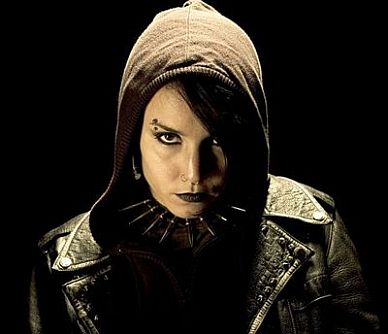 Salander is not your typical action heroine: she’s 5’4″, weighs maybe 90 lbs dripping wet, and anti-social to a degree that may be pathological. But she possesses a mind like a steel-trap, impressive computer hacking skills, a steely resolve and a zero-tolerance policy for anyone who abuses women [the Swedish title of the first book and film translates as “Men Who Hate Women”, and misogyny is something of a theme throughout the trilogy]. This was demonstrated very early: at the age of twelve, and fed up of seeing her father hurt her mother, she doused him in petrol and set him on fire. Like I said: “zero-tolerance”.
Salander is not your typical action heroine: she’s 5’4″, weighs maybe 90 lbs dripping wet, and anti-social to a degree that may be pathological. But she possesses a mind like a steel-trap, impressive computer hacking skills, a steely resolve and a zero-tolerance policy for anyone who abuses women [the Swedish title of the first book and film translates as “Men Who Hate Women”, and misogyny is something of a theme throughout the trilogy]. This was demonstrated very early: at the age of twelve, and fed up of seeing her father hurt her mother, she doused him in petrol and set him on fire. Like I said: “zero-tolerance”.
We first meet Lisbeth in Dragon Tattoo, using her skills to conduct surveillance on Mikael Blomkvist (Nyqvist), a journalist who has just lost a libel case and is facing prison as a result. As a result of her report, Blomkvist is hired by Henrik Vanger (Sven-Bertil Taube), to investigate the disappearance, forty years previously, of his niece Harriet, who was also Blomkvist’s babysitter. It has been nagging at Vanger ever since, and he feels his time is running out to find the truth. Reviewing the evidence, Blomkvist finds names and numbers in Harriet’s bible, but it’s Lisbeth, helping ‘remotely’, who cracks the code, revealing them to be verses from Leviticus about punishing sinners. The two gradually peel away the years to reveal the truth, a serial-killer whose crimes go back to just after the war – a truth that proves very uncomfortable for some in the Vanger family.
To some extent, Lisbeth is secondary to that plot, but she also has her own concerns to deal with. After the incident involving her father, she spent most of her youth under psychiatric observation. Even after release, she is still effectively ‘on probation’, under the control of various court-appointed guardians. The latest, a lawyer named Bjurman (Andersson) is a truly slimy jerk, who abuses his position to extract sexual favours from Lisbeth. After all, she’s just a little girl – what could she possibly do? See the opening paragraph for specifics there, if you’d forgotten.
Dir: Niels Arden Oplev
Star: Michael Nyqvist, Noomi Rapace, Sven-Bertil Taube, Peter Andersson
★★★★
The Girl Who Played with Fire
 It’s in the second film, Fire, that Lisbeth really comes into her own. After a period traveling the world, she returns to Sweden, and pays a visit to Bjurman, who has been looking into tattoo removal – she warns him off doing that, threatening him with his own gun. However, she leaves the gun behind, and Bjurman then uses it to frame Lisbeth for the murder of two crusading journalists, who were working on a story exposing sex traffickers, and those using the women they provide, for Blomkvist’s magazine. With both the police, and the real perpetrators – the criminal gang who control the traffic – trying to track her down, Lisbeth is forced underground. Fortunately, Blomkvist is able to help, as Lisbeth turns the table and goes after the shadowy “Zala” who leads the crime syndicate.
It’s in the second film, Fire, that Lisbeth really comes into her own. After a period traveling the world, she returns to Sweden, and pays a visit to Bjurman, who has been looking into tattoo removal – she warns him off doing that, threatening him with his own gun. However, she leaves the gun behind, and Bjurman then uses it to frame Lisbeth for the murder of two crusading journalists, who were working on a story exposing sex traffickers, and those using the women they provide, for Blomkvist’s magazine. With both the police, and the real perpetrators – the criminal gang who control the traffic – trying to track her down, Lisbeth is forced underground. Fortunately, Blomkvist is able to help, as Lisbeth turns the table and goes after the shadowy “Zala” who leads the crime syndicate.
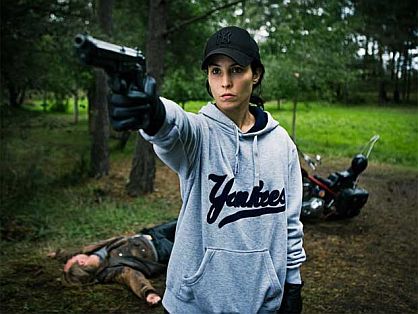 There’s a number of very interesting aspects to the film, such as how Blomkvist and Salander don’t meet until the final scene – I can’t think of many other film where the two central protagonists do that [Heat comes close]. But it’s most memorable for the unstoppable force which Salander has become, utterly fearless, whether it’s taking on a pair of bikers or going into the heart of enemy territory. Even when you think it’s all over for her, she crawls her way back in a way which would make The Bride applaud. It’s curious, yet somehow entirely fitting, to see her as an updated, adult version of another Scandinavian literary and cinematic icon: Pippi Longstocking. Except, to steal a line from Romy and Michelle, she’s like a Pippi who smokes and says “shit” a lot.
There’s a number of very interesting aspects to the film, such as how Blomkvist and Salander don’t meet until the final scene – I can’t think of many other film where the two central protagonists do that [Heat comes close]. But it’s most memorable for the unstoppable force which Salander has become, utterly fearless, whether it’s taking on a pair of bikers or going into the heart of enemy territory. Even when you think it’s all over for her, she crawls her way back in a way which would make The Bride applaud. It’s curious, yet somehow entirely fitting, to see her as an updated, adult version of another Scandinavian literary and cinematic icon: Pippi Longstocking. Except, to steal a line from Romy and Michelle, she’s like a Pippi who smokes and says “shit” a lot.
Salander’s personality is abrasive, and she clearly has difficulty relating to people or showing them anything even approximating affection: the closest she gets is a bewildered silence. I think the only time we saw her give a genuine smile was in the third film, when she received news that someone she hated had been killed. And yet, people like Blomkvist warm to Lisbeth, initially pitying the circumstances in which she finds herself, yet eventually seeing the human beneath the multiple layers of defensive ice. Fiercely loyal to her (very few, admittedly) friends, and as lethal as a boxful of well-shaken, peeved rattlesnakes to her enemies, the second film proves her to be smart, and as quick with her fists as her brain.
Dir: Daniel Alfredson
Star: Michael Nyqvist, Noomi Rapace, Yasmine Garbi, Paolo Roberto
★★★½
The Girl Who Kicked the Hornets’ Nest
The third film, like the second, has Blomkvist and Salander apart for almost the entire movie; they meet only right at the end, in a way which is as low-key and unobtrusive as an Ikea coffee-table, yet somehow feels entirely appropriate. This time, their separation is because Salanger is in custody for attempted murder, following the events at the end of Fire. The secret group in authority, whose activities are in danger of being exposed, intend to avoid the embarrassment of a trial by getting Salander certified as insane, so she can be locked up as mentally incompetent. This brings her back to confront Dr. Peter Teleborian (Ahlbom), the man in charge of the institute where Lisbeth spent two years. However, Blomkvist asks his lawyer sister, Annika (Hallin), to take up the case. Can they reveal the truth before Lisbeth is committed to Teleborian’s sinister care one more?
While undeniably a good end to the trilogy, tying up the loose ends and dishing out justice in a solid, satisfying way, it seems a shame to have Lisbeth locked up for 95% of the film. This is much more a purely-investigative thriller than the first two, which were more action-oriented. Here, there’s a fight in a restaurant for Blomkvist, and Salander’s only action is an admittedly impressive battle in a warehouse against an unstoppable force. Much as at the end of the first movie, she doesn’t actually kill the opponent herself, though here, that would be more due to a lack of ammunition for her impromptu weapon. While a nice final act by which to remember Salander, it’s not representative of her more passive role in this entry.
 The trilogy of books have sold more than 50 million copies worldwide, though sadly, Larsson didn’t see their success, as he died in 2004, before they were published. The success of the films, which have grossed a total of more than $210 million worldwide – a phenomenal sum for any non-English language series – has led to the inevitable Hollywood remake. Pause for eye-rolling here… Except, the American Tattoo does have David Fincher at the helm, so I’ll wait until seeing it – while, naturally, reserving the right to administer a good kicking in due course. The first pictures of Rooney Mara as Lisbeth (right), don’t exactly inspire confidence, as she looks more like some kind of coked-up fetish supermodel than anything else. Daniel Craig plays the role of Blomkvist, which would seem to make him a bit more glamourous too.
The trilogy of books have sold more than 50 million copies worldwide, though sadly, Larsson didn’t see their success, as he died in 2004, before they were published. The success of the films, which have grossed a total of more than $210 million worldwide – a phenomenal sum for any non-English language series – has led to the inevitable Hollywood remake. Pause for eye-rolling here… Except, the American Tattoo does have David Fincher at the helm, so I’ll wait until seeing it – while, naturally, reserving the right to administer a good kicking in due course. The first pictures of Rooney Mara as Lisbeth (right), don’t exactly inspire confidence, as she looks more like some kind of coked-up fetish supermodel than anything else. Daniel Craig plays the role of Blomkvist, which would seem to make him a bit more glamourous too.
I guess we’ll see, but Fincher and Mara will certainly have their work cut out. I can’t help thinking of the lukewarm remake of another, highly-lauded Scandinavian movie, Let the Right One In, and the overall history of such things is not cause for optimism. But even in a worst case scenario, we’ll still have the books and Noomi Rapace’s steel-cold portrayal. Wikipedia says that when Larsson was 15 years old, “he witnessed the gang rape of a girl, which led to his lifelong abhorrence of violence and abuse against women. The author never forgave himself for failing to help the girl, whose name was Lisbeth,” even though much of his life was spent fighting oppression, in various forms. But with his creation of a new style of heroine, one appropriate for the 21st century, Larsson has, unwittingly, perhaps achieved redemption.
Dir: Daniel Alfredson
Star: Michael Nyqvist, Noomi Rapace, Annika Hallin, Anders Ahlbom
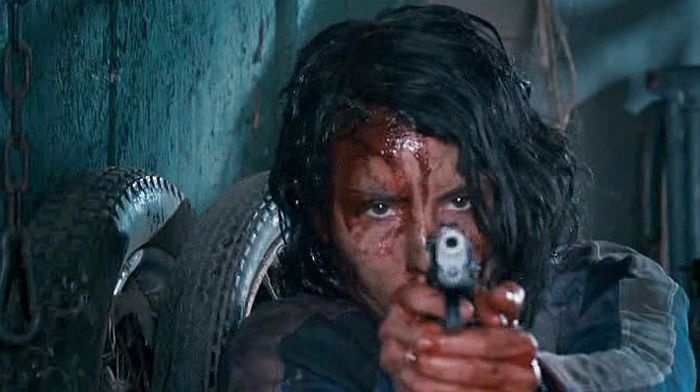
 I think this really comes down to a question of managing expectations. Hearing this was a film based on the life of Monica Proetti, Canada’s premiere female bank-robber, responsible for 20+ hold-ups before being gunned down by the cops… Well, seems like plenty of potential for action, doesn’t it? The reality is less concerned with the robberies, than the events which lead up to them. Monique Sparvieri (Bonnier) lives in the Montreal slums, working part-time as a hooker, for fun and profit. Her first husband Michael (Schorpion), is a safe-cracker who vanishes after his planned robbery is snatched from under his nose. She then hooks up with Gaston (Huard), another member of the team, and begins her own life of crime. When he is sent to jail in the mid-1960’s, she is left with limited options to provide for her children, and goes full-bore into the banking business, with yet another lover, Gerald (Dupuis).
I think this really comes down to a question of managing expectations. Hearing this was a film based on the life of Monica Proetti, Canada’s premiere female bank-robber, responsible for 20+ hold-ups before being gunned down by the cops… Well, seems like plenty of potential for action, doesn’t it? The reality is less concerned with the robberies, than the events which lead up to them. Monique Sparvieri (Bonnier) lives in the Montreal slums, working part-time as a hooker, for fun and profit. Her first husband Michael (Schorpion), is a safe-cracker who vanishes after his planned robbery is snatched from under his nose. She then hooks up with Gaston (Huard), another member of the team, and begins her own life of crime. When he is sent to jail in the mid-1960’s, she is left with limited options to provide for her children, and goes full-bore into the banking business, with yet another lover, Gerald (Dupuis).




 ★★★½
★★★½ Salander is not your typical action heroine: she’s 5’4″, weighs maybe 90 lbs dripping wet, and anti-social to a degree that may be pathological. But she possesses a mind like a steel-trap, impressive computer hacking skills, a steely resolve and a zero-tolerance policy for anyone who abuses women [the Swedish title of the first book and film translates as “Men Who Hate Women”, and misogyny is something of a theme throughout the trilogy]. This was demonstrated very early: at the age of twelve, and fed up of seeing her father hurt her mother, she doused him in petrol and set him on fire. Like I said: “zero-tolerance”.
Salander is not your typical action heroine: she’s 5’4″, weighs maybe 90 lbs dripping wet, and anti-social to a degree that may be pathological. But she possesses a mind like a steel-trap, impressive computer hacking skills, a steely resolve and a zero-tolerance policy for anyone who abuses women [the Swedish title of the first book and film translates as “Men Who Hate Women”, and misogyny is something of a theme throughout the trilogy]. This was demonstrated very early: at the age of twelve, and fed up of seeing her father hurt her mother, she doused him in petrol and set him on fire. Like I said: “zero-tolerance”. It’s in the second film, Fire, that Lisbeth really comes into her own. After a period traveling the world, she returns to Sweden, and pays a visit to Bjurman, who has been looking into tattoo removal – she warns him off doing that, threatening him with his own gun. However, she leaves the gun behind, and Bjurman then uses it to frame Lisbeth for the murder of two crusading journalists, who were working on a story exposing sex traffickers, and those using the women they provide, for Blomkvist’s magazine. With both the police, and the real perpetrators – the criminal gang who control the traffic – trying to track her down, Lisbeth is forced underground. Fortunately, Blomkvist is able to help, as Lisbeth turns the table and goes after the shadowy “Zala” who leads the crime syndicate.
It’s in the second film, Fire, that Lisbeth really comes into her own. After a period traveling the world, she returns to Sweden, and pays a visit to Bjurman, who has been looking into tattoo removal – she warns him off doing that, threatening him with his own gun. However, she leaves the gun behind, and Bjurman then uses it to frame Lisbeth for the murder of two crusading journalists, who were working on a story exposing sex traffickers, and those using the women they provide, for Blomkvist’s magazine. With both the police, and the real perpetrators – the criminal gang who control the traffic – trying to track her down, Lisbeth is forced underground. Fortunately, Blomkvist is able to help, as Lisbeth turns the table and goes after the shadowy “Zala” who leads the crime syndicate. There’s a number of very interesting aspects to the film, such as how Blomkvist and Salander don’t meet until the final scene – I can’t think of many other film where the two central protagonists do that [Heat comes close]. But it’s most memorable for the unstoppable force which Salander has become, utterly fearless, whether it’s taking on a pair of bikers or going into the heart of enemy territory. Even when you think it’s all over for her, she crawls her way back in a way which would make The Bride applaud. It’s curious, yet somehow entirely fitting, to see her as an updated, adult version of another Scandinavian literary and cinematic icon: Pippi Longstocking. Except, to steal a line from Romy and Michelle, she’s like a Pippi who smokes and says “shit” a lot.
There’s a number of very interesting aspects to the film, such as how Blomkvist and Salander don’t meet until the final scene – I can’t think of many other film where the two central protagonists do that [Heat comes close]. But it’s most memorable for the unstoppable force which Salander has become, utterly fearless, whether it’s taking on a pair of bikers or going into the heart of enemy territory. Even when you think it’s all over for her, she crawls her way back in a way which would make The Bride applaud. It’s curious, yet somehow entirely fitting, to see her as an updated, adult version of another Scandinavian literary and cinematic icon: Pippi Longstocking. Except, to steal a line from Romy and Michelle, she’s like a Pippi who smokes and says “shit” a lot. The trilogy of books have sold more than 50 million copies worldwide, though sadly, Larsson didn’t see their success, as he died in 2004, before they were published. The success of the films, which have grossed a total of more than $210 million worldwide – a phenomenal sum for any non-English language series – has led to the inevitable Hollywood remake. Pause for eye-rolling here… Except, the American Tattoo does have David Fincher at the helm, so I’ll wait until seeing it – while, naturally, reserving the right to administer a good kicking in due course. The first pictures of Rooney Mara as Lisbeth (right), don’t exactly inspire confidence, as she looks more like some kind of coked-up fetish supermodel than anything else. Daniel Craig plays the role of Blomkvist, which would seem to make him a bit more glamourous too.
The trilogy of books have sold more than 50 million copies worldwide, though sadly, Larsson didn’t see their success, as he died in 2004, before they were published. The success of the films, which have grossed a total of more than $210 million worldwide – a phenomenal sum for any non-English language series – has led to the inevitable Hollywood remake. Pause for eye-rolling here… Except, the American Tattoo does have David Fincher at the helm, so I’ll wait until seeing it – while, naturally, reserving the right to administer a good kicking in due course. The first pictures of Rooney Mara as Lisbeth (right), don’t exactly inspire confidence, as she looks more like some kind of coked-up fetish supermodel than anything else. Daniel Craig plays the role of Blomkvist, which would seem to make him a bit more glamourous too.
 It makes sense that this stems from a drunken agreement between the three co-directors at a film festival, because this is the sort of film you would only make under inebriated terms, and it’s probably true to say that drunk is the best way to watch this. That’s not a bad thing per se, just that its loopy sensibilities and over-the-top antics would seem to go
It makes sense that this stems from a drunken agreement between the three co-directors at a film festival, because this is the sort of film you would only make under inebriated terms, and it’s probably true to say that drunk is the best way to watch this. That’s not a bad thing per se, just that its loopy sensibilities and over-the-top antics would seem to go 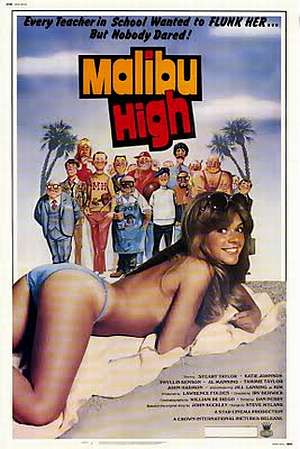 This one popped out of nowhere, on a box-set of discs called Drive-In Cult Classics: most of these were unremarkable double-feature fillers, and this started off looking the same way, Kim (Lansing) is fed up with life: she’s still in high-school at age 18, is about to flunk it, has no money, just lost her boyfriend (Taylor), her father hung himself and her mom’s a total bitch. Finally, she opts to use her natural resources (if you know what I mean, and I think you do) to resolve these issues – though when her mother suggested Kim get a job, I’m not sure she meant as a whore working in the back of a VW van for the ultra-sleazy Tony (Mann). Her ‘popularity’ there lets her move up to work for the slightly-less sleazy Lance (Howard). Which is where the film takes an abrupt right turn, as she discovers a taste for killing – not least on her former pimp – and starts work as, to use one of the movie’s alternate titles, a high-school hit girl.
This one popped out of nowhere, on a box-set of discs called Drive-In Cult Classics: most of these were unremarkable double-feature fillers, and this started off looking the same way, Kim (Lansing) is fed up with life: she’s still in high-school at age 18, is about to flunk it, has no money, just lost her boyfriend (Taylor), her father hung himself and her mom’s a total bitch. Finally, she opts to use her natural resources (if you know what I mean, and I think you do) to resolve these issues – though when her mother suggested Kim get a job, I’m not sure she meant as a whore working in the back of a VW van for the ultra-sleazy Tony (Mann). Her ‘popularity’ there lets her move up to work for the slightly-less sleazy Lance (Howard). Which is where the film takes an abrupt right turn, as she discovers a taste for killing – not least on her former pimp – and starts work as, to use one of the movie’s alternate titles, a high-school hit girl. Despite being directed by the same man as part one, this is only tangentially-connected to the first two films. The most obvious difference is no Shin Eun Kyung, who was the glue that held those movies together. Instead, as noted above, there is no wife at all: Shu Qi stars instead, as Lim Aryong, a mobster’s daughter forced to flee Hong Kong after her apparent involvement in murdering the leader of a rival gang. She goes to Korea and is put under the protection of Ki-Chul (Lee), a fairly crap mobster whose sole qualification for the job is a few words of Chinese. However, his star begins to rise and he develops a tough-guy rep: it’s really Lim who is responsible, but the local criminals would rather credit Ki-Chul than admit they got their asses kicked by a girl. Eventually, her hiding-place becomes known, and a team of vengeful assassins is dispatched to Korea to take care of Lim.
Despite being directed by the same man as part one, this is only tangentially-connected to the first two films. The most obvious difference is no Shin Eun Kyung, who was the glue that held those movies together. Instead, as noted above, there is no wife at all: Shu Qi stars instead, as Lim Aryong, a mobster’s daughter forced to flee Hong Kong after her apparent involvement in murdering the leader of a rival gang. She goes to Korea and is put under the protection of Ki-Chul (Lee), a fairly crap mobster whose sole qualification for the job is a few words of Chinese. However, his star begins to rise and he develops a tough-guy rep: it’s really Lim who is responsible, but the local criminals would rather credit Ki-Chul than admit they got their asses kicked by a girl. Eventually, her hiding-place becomes known, and a team of vengeful assassins is dispatched to Korea to take care of Lim.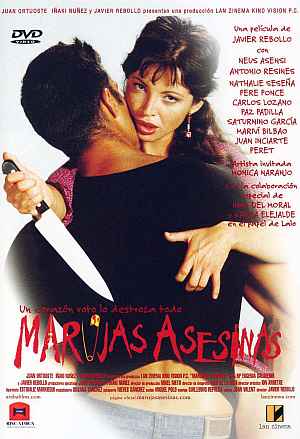 This tale of a Hispanic wife whose sanity disintegrates, beginning with the murder of her husband and ending with…well, you have to see it, had me shifting somewhat nervously, as
This tale of a Hispanic wife whose sanity disintegrates, beginning with the murder of her husband and ending with…well, you have to see it, had me shifting somewhat nervously, as 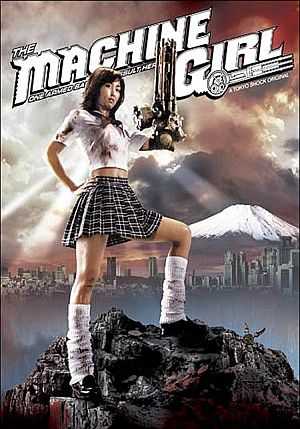
 If you enjoyed Planet Terror, you’ll likely get a kick out of this, which also combines elements of The Evil Dead, Kill Bill and Tetsuo the Iron Man into what has got to be the bloodiest movie of 2008. The life of Ami (Yashiro) is turned upside down when her brother and his friend are killed by school bullies under the control of a local gangster’s son (Nishihara). Ami sets out for revenge on all those responsible for the killings. But the Yakuza don’t take kindly to this and Ami finds herself with a count of functioning limbs that ends at three. Does that stop her? Of course not. Teaming up with the late friend’s mother Miki (Asami), whose husband happens to be an ace mechanic, Ami gets fitted with a machine-gun and the pair of vengeful vixens head off for a return match.
If you enjoyed Planet Terror, you’ll likely get a kick out of this, which also combines elements of The Evil Dead, Kill Bill and Tetsuo the Iron Man into what has got to be the bloodiest movie of 2008. The life of Ami (Yashiro) is turned upside down when her brother and his friend are killed by school bullies under the control of a local gangster’s son (Nishihara). Ami sets out for revenge on all those responsible for the killings. But the Yakuza don’t take kindly to this and Ami finds herself with a count of functioning limbs that ends at three. Does that stop her? Of course not. Teaming up with the late friend’s mother Miki (Asami), whose husband happens to be an ace mechanic, Ami gets fitted with a machine-gun and the pair of vengeful vixens head off for a return match.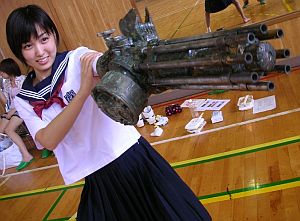 Yashiro’s background is in…well, what could politely be described as ‘bikini videos’, not action movies, but her performance here is respectable enough. Probably more impressive are Asami, and Honoka, who plays the wife of the Yakuza boss. They both, too, come from the adult industry, possessing an impressive feral intensity which reminded me of Brigitte Lahaie in Fascination, and is entirely in keeping with the grindhouse feel of the entire enterprise. You could argue that the trailer contains everything you need to see, in a more concentrated form, and I wouldn’t argue with that, or if you said this was no more than a porn variant, where nothing matters except the money shots of body fluids getting sprayed everywhere. Still, we had a blast, and the film fully lives up to the sleeve description, delivering the “One-Armed Ballistic Assault Heroine” it promises, in spades.
Yashiro’s background is in…well, what could politely be described as ‘bikini videos’, not action movies, but her performance here is respectable enough. Probably more impressive are Asami, and Honoka, who plays the wife of the Yakuza boss. They both, too, come from the adult industry, possessing an impressive feral intensity which reminded me of Brigitte Lahaie in Fascination, and is entirely in keeping with the grindhouse feel of the entire enterprise. You could argue that the trailer contains everything you need to see, in a more concentrated form, and I wouldn’t argue with that, or if you said this was no more than a porn variant, where nothing matters except the money shots of body fluids getting sprayed everywhere. Still, we had a blast, and the film fully lives up to the sleeve description, delivering the “One-Armed Ballistic Assault Heroine” it promises, in spades. ★★★★★
★★★★★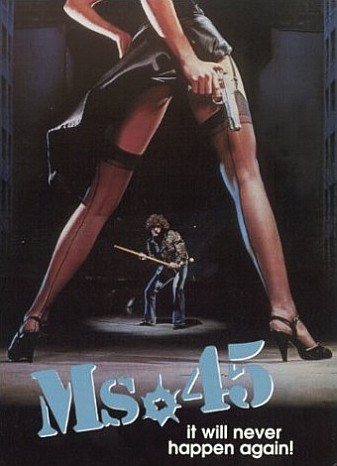
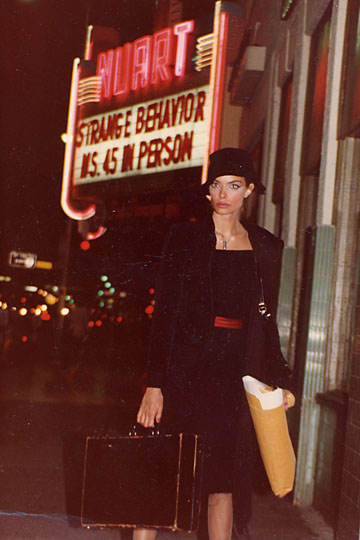 Hmm. While I can acknowledge the political subtext in Thana’s muteness [especially since it appears largely to be psychological, going by the last scene], I’m not quite sure how seriously I take this claim overall, given Ferrara actually plays one of the rapists, and a large percentage of the time is spent objectifying and fetishizing his lead actress, to the extent where Chris felt she looked like a supporting actress in a Robert Palmer video. Perhaps the most memorably instance of this is Thana, dressing up as a nun – but one that also wears stocking and suspenders – before heading out to a Halloween party. With her blood-red lipstick, she kisses each of the bullets before loading them into her gun, a sequence which tells us much about Ferrara’s repressed Catholicism [also apparently rampant in Lieutenant, where both Ferrara and Lund worked on the script], as well as paying homage to the other great New York street-sweeper, Travis Bickle from Taxi Driver.
Hmm. While I can acknowledge the political subtext in Thana’s muteness [especially since it appears largely to be psychological, going by the last scene], I’m not quite sure how seriously I take this claim overall, given Ferrara actually plays one of the rapists, and a large percentage of the time is spent objectifying and fetishizing his lead actress, to the extent where Chris felt she looked like a supporting actress in a Robert Palmer video. Perhaps the most memorably instance of this is Thana, dressing up as a nun – but one that also wears stocking and suspenders – before heading out to a Halloween party. With her blood-red lipstick, she kisses each of the bullets before loading them into her gun, a sequence which tells us much about Ferrara’s repressed Catholicism [also apparently rampant in Lieutenant, where both Ferrara and Lund worked on the script], as well as paying homage to the other great New York street-sweeper, Travis Bickle from Taxi Driver.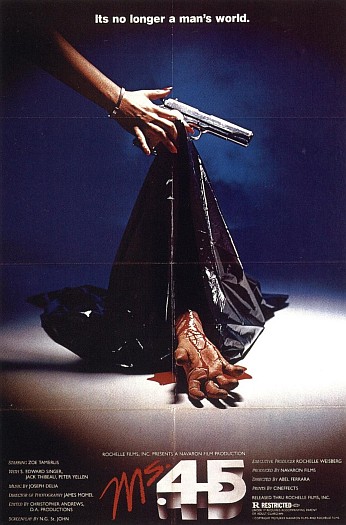 There are certainly holes in the plot logic. Where is Thana getting all the bullets from, and why is she such a crack-shot, despite presumably having never having handled a gun before? Yet these are in step with the pitch-black tongue-in-cheek humour the film contains: witness the long, rambling monologue inflicted on Thana by a guy she meets in a bar [her muteness making her the ultimate good listener]. I laughed like a
There are certainly holes in the plot logic. Where is Thana getting all the bullets from, and why is she such a crack-shot, despite presumably having never having handled a gun before? Yet these are in step with the pitch-black tongue-in-cheek humour the film contains: witness the long, rambling monologue inflicted on Thana by a guy she meets in a bar [her muteness making her the ultimate good listener]. I laughed like a 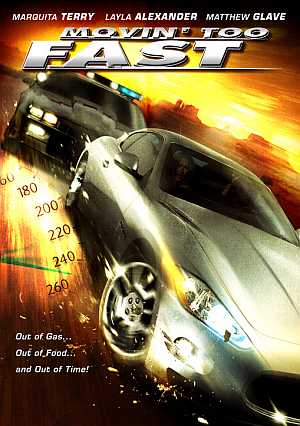 Yes, while there may not be a lot new here, the combination is at least somewhat interesting, and it’s put together solidly enough. Two students, Nina (Alexander) and Melissa (Terry) are on a cross-country drive, when they get stopped for speeding. Melissa makes a pass at the cop, but it’s an encounter that goes badly wrong, and she ends up beating him up with his own night-stick. When the duo get back on the road however, they find themselves being pursued by a police-car, which clearly has very bad intentions: with gas running low and – inevitably – no cellphone service to be found, can they survive?
Yes, while there may not be a lot new here, the combination is at least somewhat interesting, and it’s put together solidly enough. Two students, Nina (Alexander) and Melissa (Terry) are on a cross-country drive, when they get stopped for speeding. Melissa makes a pass at the cop, but it’s an encounter that goes badly wrong, and she ends up beating him up with his own night-stick. When the duo get back on the road however, they find themselves being pursued by a police-car, which clearly has very bad intentions: with gas running low and – inevitably – no cellphone service to be found, can they survive? Sometimes, you just have to sit back and let the DVD sleeve do the talking. “The notorious serial killer, Harry Eugene Loveless AKA Mr. HELL roamed from town-to-town and job-to-job, brutally murdering his victims, with the demonic intention of removing the ‘windows to the soul’ – their eyes! Mr. HELL mutilated Dr. Karl Matthews at a government laboratory where biological weapons were secretly being developed. The daughter’s precocious daughter, Tyler, who discovered her father’s body with his eyes missing, was then pursued by Harry through the lab’s subterranean tunnels. During the chase, Harry was accidentally destroyed by toxic industrial acid, and his remains flowed into a storage container. Was this the end for Mr. HELL?
Sometimes, you just have to sit back and let the DVD sleeve do the talking. “The notorious serial killer, Harry Eugene Loveless AKA Mr. HELL roamed from town-to-town and job-to-job, brutally murdering his victims, with the demonic intention of removing the ‘windows to the soul’ – their eyes! Mr. HELL mutilated Dr. Karl Matthews at a government laboratory where biological weapons were secretly being developed. The daughter’s precocious daughter, Tyler, who discovered her father’s body with his eyes missing, was then pursued by Harry through the lab’s subterranean tunnels. During the chase, Harry was accidentally destroyed by toxic industrial acid, and his remains flowed into a storage container. Was this the end for Mr. HELL?